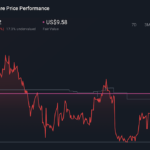
Tony Hsieh, the Zappos.com luminary who revolutionized the shoe business and established a unique corporate culture along the way, has died at age 46.
Hsieh’s family confirmed his death Friday night in a text message to friends, noting that Tony’s generous spirit touched the lives of countless people and that he left an indelible mark on the world.
More from WWD
The executive died from injuries sustained in a Connecticut house fire, according to press reports citing a family lawyer.
Hsieh, a serial entrepreneur, co-founded Zappos in 1999 and grew it into a blockbuster business before selling it to Amazon in 2009.
Delivering happiness was the executive’s mantra. As he built Zappos, Hsieh’s chief goal was to redefine the meaning of company culture. From the beginning, his singular vision set the company apart as a pioneer in footwear e-commerce and corporate America.
“The world has lost a tremendous visionary and an incredible human being,” said Zappos chief executive officer Kedar Deshpande in a note to employees on Friday. “We recognize that not only have we lost our inspiring former leader, but many of you have also lost a mentor and a friend. Tony played such an integral part in helping create the thriving Zappos business we have today, along with his passion for helping to support and drive our company culture.”
Hsieh, who retired and stepped down from the Zappos helm this past summer, told WWD’s sister publication Footwear News last year how much the company had evolved since it was founded two decades ago.
“A lot of our growth and innovation moving forward will be based on thinking about what we’re in the business of differently,” Hsieh told FN last year, when Zappos celebrated its 20th anniversary. “We used to say we’re a service company that just happens to sell shoes, and now it’s turned into: We’re a service company that just happens to sell blank.”
The Zappos origin story is a familiar one — Hsieh shared it in his speaking engagements and in the pages of his New York Times best-seller, “Delivering Happiness: A Path to Profits, Passion, and Purpose.” And the 100,000-plus visitors who have toured Zappos’ headquarters have been regaled with the tale of a fateful phone call.
After Zappos co-founder Nick Swinmurn latched onto the idea of selling shoes online, he left a voicemail with Hsieh’s San Francisco venture capital fund, Venture Frogs, hooking him with one factoid: “It was the fact that 5 percent of a $40 billion shoe business was already being done through mail order,” Swinmurn told FN during a 2009 interview. “That was my big statistic. People were already buying shoes without trying them on.”
Then, after another call to the Nordstrom department store in San Francisco, Fred Mossler eventually jumped on board, and together the new team set out to change the industry.
Zappos was a pioneer in free shipping and returns, and it didn’t take long for the concept to take hold as e-commerce took off.
In 2009, Zappos was acquired by Amazon.com Inc. for 10 million shares of Amazon stock, which, at the time of the deal, Hsieh said was valued at about $1.2 billion.
While many market watchers celebrated the marriage, they also speculated that the new parent could impose its own culture on the new division. But true to the initial agreement, Zappos has continued to operate separately from Amazon, maintaining its own leadership team and unique character.
Several years into the Amazon partnership, Hsieh launched The Downtown Project, an initiative to revitalize downtown Las Vegas.
The goal, Hsieh explained at FN’s 2013 CEO Summit, was to create a neighborhood that is walkable and community-focused. The Downtown Project is even investing in individuals, helping them realize their dreams of starting small businesses. “We are thinking of the city as a startup,” he said. “We want it to be the anti-Strip — with bars and coffee shops.”
In 2015, Zappos did away with managers in favor of a form of self-organization called holacracy.
In a blog post at the time, Hsieh wrote, “Like all the bold steps we’ve done in the past, it feels a little scary, but it also feels like exactly the type of thing that only a company such as Zappos would dare to attempt at this scale.”
Since its early days, Zappos has functioned as something of an incubator for testing theories about corporate culture and productivity — long before those ideas became the buzzwords they are today. Much of the credit for that lies with Hsieh.
“His spirit will forever be a part of Zappos, and we will continue to honor his memory by dedicating ourselves to continuing the work he was so passionate about,” Deshpande wrote in the note to employees. “Our thoughts remain with him and his loved ones. Zappos is a family, and we will continue to hold Tony close in our hearts.”







